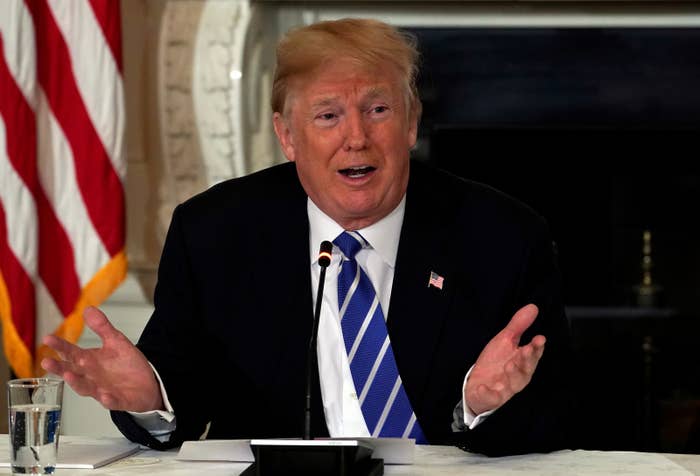
President Donald Trump once said he would step in if Congress failed to save the Deferred Action for Childhood Arrivals program before it expires this March. Congress has failed, but the White House is showing no signs of getting involved.
Trump helped tank a bipartisan immigration bill this week by loudly denouncing it in the hours leading up to the vote, going as far as to issue a veto threat. The bill ended up falling six votes short on the floor of the Senate, with only eight Republicans voting for it. It came the closest of four immigration bills that all failed in a vote series Thursday, including a Trump-backed plan.
DACA is set to expire on March 5, leaving 700,000 people who are currently protected from deportation in limbo (though court injunctions will shield DACA recipients from immediate deportation.) It’s not clear whether Trump will call for new legislation, extend DACA unilaterally, or do nothing.
“The ball is totally in President Trump’s corner. He has total control of the situation now,” said one Senate GOP aide.
Trump once seemed open to extending DACA on his own. Last fall, after the administration announced it was canceling the program, Trump stated that he could ultimately extend the deadline. He also tweeted that he would “revisit the issue” if Congress could not reach a deal.
But he has given no such indications in recent months and has stated wildly differing positions on immigration, including tweeting this week that it would be the “last chance” to deal with DACA, “there will never be another opportunity!”
Recently, Trump’s top aides have rejected or dodged questions regarding the president’s willingness to extend the deadline. “I doubt very much” that Trump will step in, said Chief of Staff John Kelly earlier this month, when he was asked about an extension, adding that he wasn’t even sure if the president had the authority to extend the program. Other aides have repeatedly said that they’re focused on getting their preferred legislative solutions through Congress instead of discussing a deadline extension.
Congress now has 6 months to legalize DACA (something the Obama Administration was unable to do). If they can't, I will revisit this issue!
Asked about the upcoming March 5 deadline and the lack of a deal, a White House official said during a call Thursday that DACA recipients “falling out of status would not trigger them into being an enforcement priority” for deportation. But the official, who declined to be named, also added: “Of course, all of the laws of the United States are always enforced by DHS with individuals whom they encounter.”
The White House did not respond to a request for comment Friday to clarify the president’s position on whether he will take action to protect DACA.
Trump’s own immigration bill, which would have given DACA recipients a path to citizenship, put $25 billion toward border security, and significantly curtailed the ability of citizens to sponsor foreign relatives for citizenship, was resoundingly defeated in the Senate Thursday. It received just 39 votes out of a needed 60, fewer than any of the other three plans senators voted on.
Congress is now quietly starting to turn to a fallback option, but it would not pass until after the March 5 deadline has passed. The plan being discussed is to extend DACA for two-to-three years as part of a spending bill that must pass by March 24 to avoid the third government shutdown this year.
Politicians on both sides of the aisle have disparaged this path as a failure. It would essentially kick the problem down the road, providing no long-term solution for DACA recipients. And yet, there doesn’t appear to be any other option.
Even a short-term patch would not have a guaranteed path forward. While it would likely gain over 60 votes in the Senate, it is not clear that House Speaker Paul Ryan would allow a DACA extension to be included in a House spending bill. Ryan’s office said Friday they are currently focused on an immigration bill from Republican Rep. Bob Goodlatte, though that would be a nonstarter in the Senate. It’s also not clear that Trump would sign off on an extension. That could lead to a standoff, and potentially another government shutdown.
Democrats have been loathe to consider a short-term fix because of the fear that once that precedent is set, DACA extensions, rather than permanent protections, will become the norm. That would leave recipients in legal purgatory, with no path to citizenship and their ability to live and work in the US up for renewal every two or three years.
Democrats had not yet started talks about a short-term patch, said one Senate Democratic aide, but will likely start after Congress returns from a weeklong break on Feb. 26.
“There will be a collective deep breath and talks about how to proceed,” said the aide.


